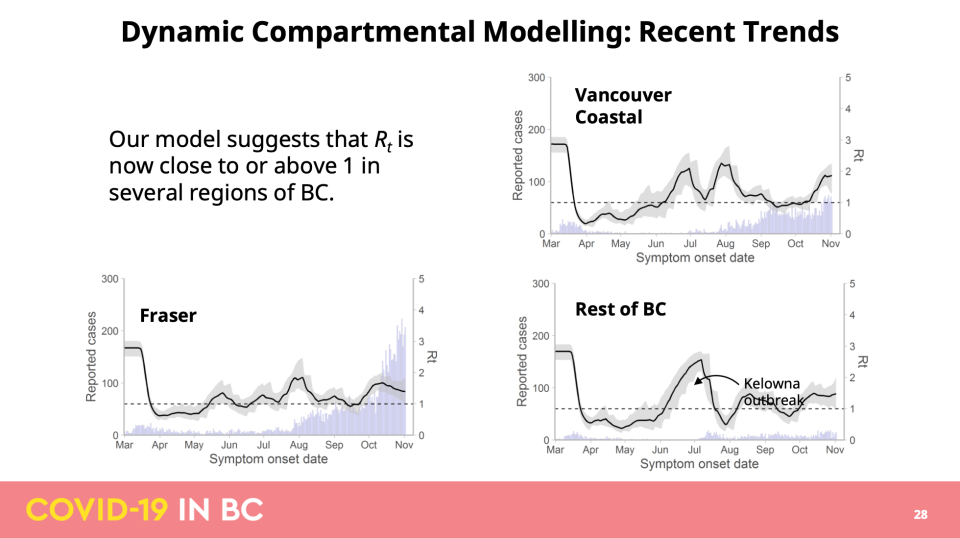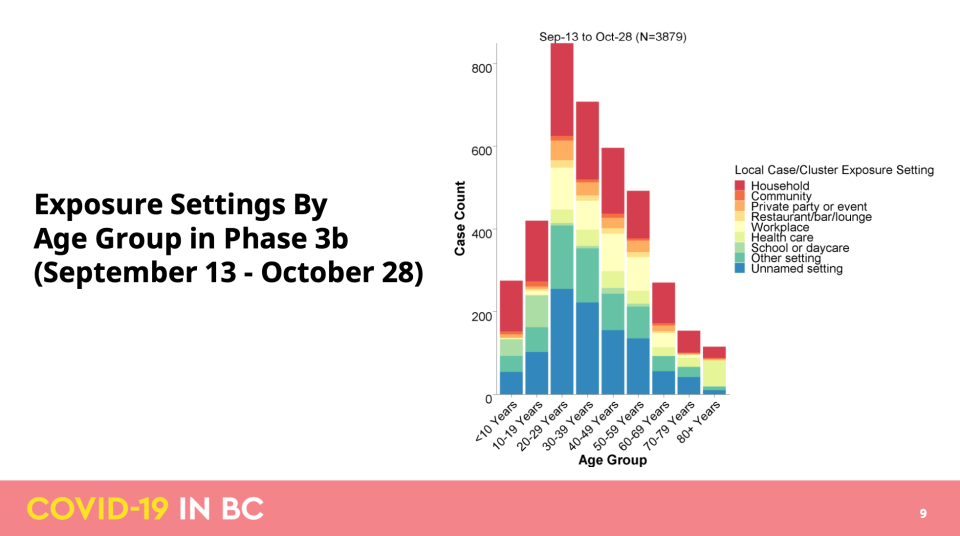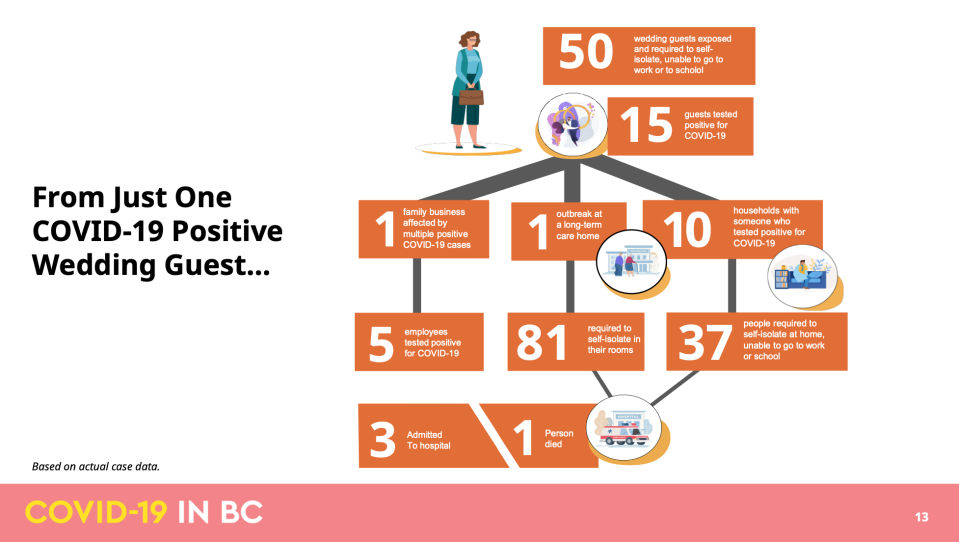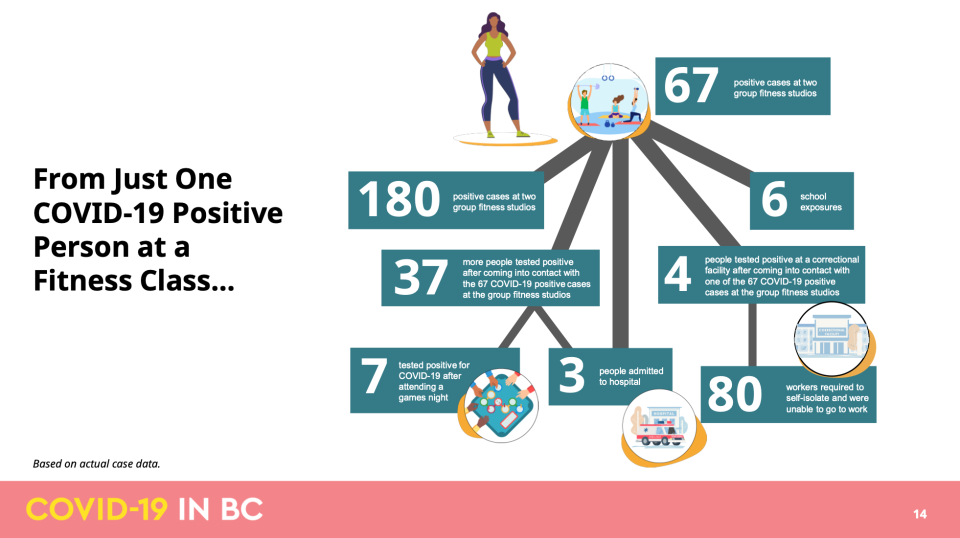'We need to put the brakes on COVID-19 transmission': B.C. releases 'concerning' modelling data after 'takeoff' of COVID-19 cases
Officials in British Columbia presented some “concerning” new modelling data after a “takeoff” of COVID-19 cases, with concerns that the province could see more than 1,000 cases per day by the end of November.
“We are not trying to get this virus down to zero,” Dr. Henry, B.C.’s provincial health officer, said. “We’ve come to understand that this is a virus that transmits in our community and it’s going to be with us for some time, it’s going to be with us through this winter, and we need to find ways to live with it without putting people at risk, particularly our seniors and our elders.”
“We need to put the brakes on COVID-19 transmission, we need to come back to making our wall strong so we can manage and control the spread instead of it controlling us. We are in a challenging time, perhaps the most challenging time of this pandemic,...but it will end, we do have hope, this is not forever.

B.C.’s reproductive value, the number of people each case transmits the virus to, is above one, which could lead to more “rapid” spread.
“The bottom line is, that we are above one, which means that on average people are spreading to more than one other person,” Dr. Henry said. “When you’re above one, that gives the potential for it to spread quite rapidly.”

The most significantly impacted areas of the province remain the Vancouver Coastal and Fraser regions, but there have also been clusters of transmission linked to people travelling within the province, or in and out of other provinces.
“We are not out of the woods in the rest of the province,” Dr. Henry stressed. “We need to start paying attention again to [take] those measures that reduce the probability that we’re going to spread this virus.”

B.C.’s provincial health officer said the primary type of exposure setting has been households or through community interactions, the social interactions people have.
She added that there have also been issues around people gathering before or after organized sports leagues and gym/fitnesses classes.
“A lot of the focus of transmission in our communities, particularly in the Fraser Health and Vancouver Costal regions, is because of our social interactions, where it’s in the community or in our home,” Dr. Henry said.

She added that there have been very few transmission events in schools and daycares.

Dr. Henry also shared a number of situations where extensive COVID-19 transmission was sparked by close contact situations.
“It just takes one lapse that can have many, multiple effects,” she said.

She explained that there are settings that are more risky than others, including indoor group exercise where people are exerting themselves and breathing heavily.

Dr. Henry stressed that there are activities that could be done in the summer that people in the province need to “take a step back from” right now.
“We’re learning that it doesn’t spread as well when temperatures are warmer, when humidity is lower,” she said. “But as we move into what we call our respiration season...we’re finding that this virus...finds it easier to transmit.”

The provincial health officer said that as B.C. sees “dramatic” increases in cases, public health’s ability to get information on the infection location and transmission is being impacted.
“With our rapid increase in the number of people affected by COVID-19 in the last few weeks, this has been put at jeopardy, our ability in public health to find everybody in a timely way,” Dr. Henry said. “Particularly [the] Fraser Health and Vancouver Coastal region have been stretched to the max and we are falling a little bit behind.”
She said that the COVID-19 situation next week will be a key identifier of the effectiveness of the public health measures in place.
When asked if British Columbians should have any hope of a relatively “normal” holiday season, Dr. Henry said things will look different this year with people needing to stay more physically apart.
“I think Santa probably has immunity,” she said. “I think he’ll be washing his hands a lot and he probably won’t be eating cookies and milk in every house this year but we’ll find ways of making it work.”


